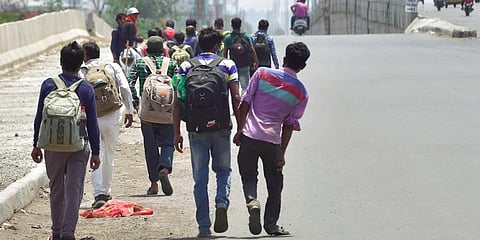

NEW DELHI: Communities struggled with hunger with loss of livelihood amid the lockdown with inter-state and intra-state migrant workers being the worst hit, according to a survey by Centre for Equity Studies in collaboration with Delhi Research Group and Karwan-E-Mohabbat.
Ninety two per cent of the respondents had lost their jobs, said the survey which covered both migrant and non-migrant workers. Among those interviewed, 24.5 per cent were women and 75.5 per cent men. Most of the respondents belong to Uttar Pradesh followed by Bihar, Assam, Jharkhand, and Delhi.
Over 10.5 per cent of the over 1,400 interviewees said they were out of food for more than seven days facing an extreme hunger situation, according to the report Labouring Lives: Hunger, Precarity and Despair amid Lockdown.
Around 30 per cent of respondents said they occasionally went out of food -- for one-two days, and 20 per cent people said they frequently ran out of food for four-seven days during the period of lockdown.
Among those who reported they never ran out of food said they reduced their intake and often had one meal a day. At least 5 per cent were skipping meals to provide food for their children.
The respondents had no access to social security measures, the report pointed out. This would mean they did not lack access to institutional support amid the pandemic alone but even under normal circumstances.
Whlie around 25 per cent of the respondents in the survey had no sources of support for food during the lockdown, 43.3 per cent received support from civil society organisations and 38.7 per cent from the government. According to the analysis, one-fourth of the interviewees who did not receive any support comprised Muslims, women, non-migrant workers and those earning less than Rs 5,000 a month.
In the pre-COVD-19 phase, among those interviewed, women, Dalits, and Muslim earned lesser, it said.
The report covered casual labourers, self-employed persons, and monthly salary earners.
The government should have addressed food and livelihood concerns of workers from the day the lockdown came in to effect, the study observed.